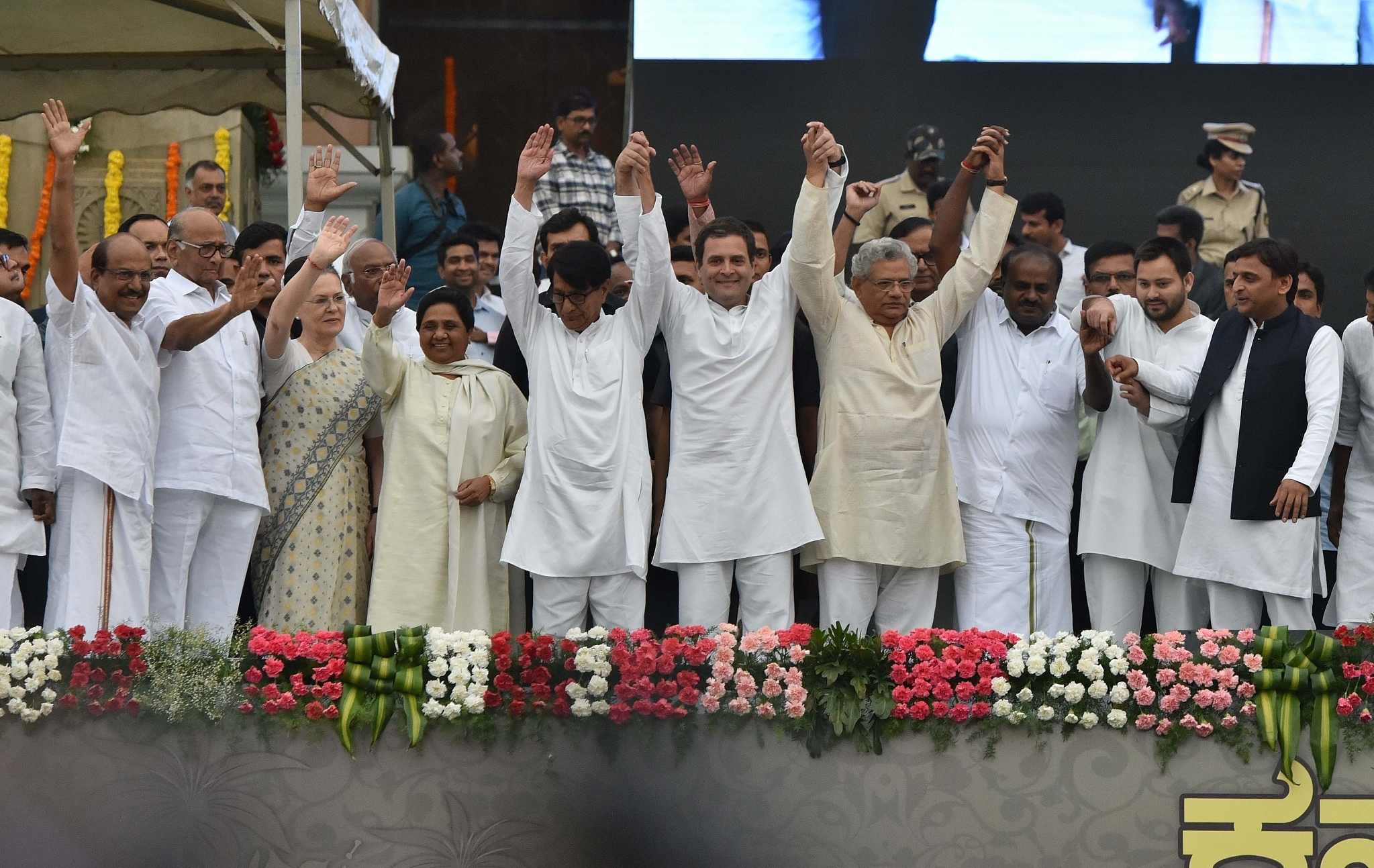Politics
Did Political And Media Rhetoric Against Vaccination Cause Additional Deaths?
- An example of an anti-vaccine exhortation is a short video which shows a Muslim cleric saying that the vaccine has a 'chip' in it which will 'control your mind'.

The forces against the BJP (Photo by Arijit Sen/Hindustan Times via Getty Images)
Could it be that the steady drumbeat of political, mainstream media and social media rhetoric creating doubt in the public mind about the efficacy of vaccines increased the death-count from COVID-19 in India over the past few weeks?
The answer seems to be: “possibly”. Let’s take a look, drawing on polls conducted between October and April; readers may, of course, draw their own conclusions.
According to LocalCircles, a Noida (India)/Santa Clara (US) based research agency which started doing vaccine hesitancy research in India from last year, around 61 per cent of Indians were “sceptical about COVID-19 vaccine even if it is available in 2021”.
More than half of those polled (51 per cent) said they “won’t rush to take it due to unknowns associated with it”.
Next, in a press release on 18 December 2020, LocalCircles said that vaccine hesitancy had declined briefly in November to 59 per cent but shot up again to 69 per cent in December.
From December 2020, all sorts of rumours spread about the vaccine that certainly dissuaded people from acting promptly.
For instance, this report in the BBC, claims “Some Islamic scholars in India have said that no Muslim should have Covid vaccines, claiming that they could contain pork products”.
It also states that: “One short video shows a Muslim cleric saying that the vaccine has a chip in it which will control your mind”.
On 28 December, in a memorandum to President Ramnath Kovind, All India Hindu Mahasabha President Swami Chakrapani said it should be clarified that cow's blood or any such substance has not been used in the vaccine, which "hurts the spirit of Hindu Sanatan Dharma".
While such notions may seem ludicrous to deracinated elites, there are plenty of literate, semi-literate and illiterate folk in the country who take the words of people in authority, governmental or religious, very seriously indeed.
Simultaneously, and unsurprisingly, social media was thick with doubt and insinuation being spread about vaccination. This report in the Times of India back on 15 December 2020 indicates the state of affairs.
It states: “Syed Nazakat, founder of fact-checking platforms Dataleads and Health Analytics Asia… says they have noticed conspiracy theories related to vaccines in full swing”.
Opposition politicians and the mainstream media (local and international) only got into the act energetically in January, just after clearance was given on 3 January for COVAXIN, then in the third-stage trials. (Note that the regulator said the vaccine had been approved for "restricted use in emergency situation in public interest as an abundant precaution, in clinical trial mode, especially in the context of infection by mutant strains").
The anti-vaccine comments from politicians was covered in an article in Swarajya by Aravindan Neelakandan. Here is a tabulated selection of quotes from politicians, media and even a businessman.
However, none of this seems to have had a major impact on vaccine hesitancy by early January, which stayed at 69 per cent as per the LocalCircles press release issued on 6 January 2021.
In fact, by 4 February, the sentiment in favour of vaccines had improved, with only 58 per cent now reluctant to get it.
And on 3 April, the latest report from LocalCircles indicated that people willing to get the vaccine had gone up to 77 per cent. By then, of course, it was too late.
So did the negative rhetoric contribute to the apathy and complacency? Possible, but it does not appear to have had any definitive impact. While the anti-vaccine mood was present, that was by no means the only messaging out there.
It must be remembered that the central government was repeatedly cautioning people to minimise risks. The election rallies and the Kumbh do not seem to have had a major impact either, at least so far, as most of the deaths have been happening in other states. Just as there were anti-vaccine messages, the mainstream and social media were simultaneously full of exhortations for people to go and get their vaccination.
Large corporations and MSMEs were also filling the advertising space with supplementary pro-vaccine calls. Clearly, all this must have had some balancing effect on the anti-vaccine rhetoric.
Where does that leave us? It appears that everything from public indifference, to central and state government uncertainty and missteps, to a genuine and acceptable fear of the unknown has led us to the pandemic spread that is currently unfolding.
As a country and an extremely resilient people, we need to keep in mind that this sort of Black Swan event is not something that anyone can be fully prepared for.
We can only deal with it by mental fortitude, a stoic attitude and a determination to pull through together.
An analysis of what could have been done better can be done afterwards, and lessons learned can be recorded. But we may not have a chance to apply them, because the next time a pandemic comes along, one thing we can be sure of: It will not be the same.
Introducing ElectionsHQ + 50 Ground Reports Project
The 2024 elections might seem easy to guess, but there are some important questions that shouldn't be missed.
Do freebies still sway voters? Do people prioritise infrastructure when voting? How will Punjab vote?
The answers to these questions provide great insights into where we, as a country, are headed in the years to come.
Swarajya is starting a project with an aim to do 50 solid ground stories and a smart commentary service on WhatsApp, a one-of-a-kind. We'd love your support during this election season.
Click below to contribute.
Latest